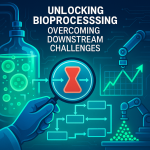🤖 These factories will respond dynamically to market changes, enhancing efficiency and sustainability. Key technology components include data-driven insights and automation.
📈 Ultimately, this shift promises significant reductions in costs and increases in productivity, benefiting industry and society alike.
Introduction:
The article discusses Merck KGaA’s vision for a “SMARTfacturing” ecosystem, highlighting the transformative potential of smart manufacturing within the bioprocessing industry and beyond. This concept emphasizes the integration of advanced digital technologies to improve manufacturing processes and supply-chain management, ultimately benefiting people and the planet.
- SMARTfacturing is a comprehensive shift from traditional manufacturing to a smarter, technologically integrated approach that incorporates AI and digital tools.
- The vision includes structurally designed, modular factories that can dynamically adjust to market demands and optimize resource use.
- At the core of the SMARTfacturing ecosystem is a control tower that utilizes AI, real-time data, and predictive analytics to enhance decision-making and operational efficiency.
- Key technology enablers such as connected industrial equipment and process science are essential for ensuring quality and compliance, thereby enhancing operational resilience.
- Despite challenges in digital foundation building, transitioning to SMARTfacturing is expected to yield significant benefits, including reduced maintenance costs and increased labor productivity, while also supporting sustainability and innovation.
Conclusion:
Merck KGaA’s commitment to SMARTfacturing represents a long-term investment in industrial excellence aimed at improving operational efficiency and sustainability. The company’s strategies are positioned to not only adapt to current challenges but also shape a future where manufacturing is more agile, innovative, and environmentally friendly, ultimately benefiting all stakeholders involved.



